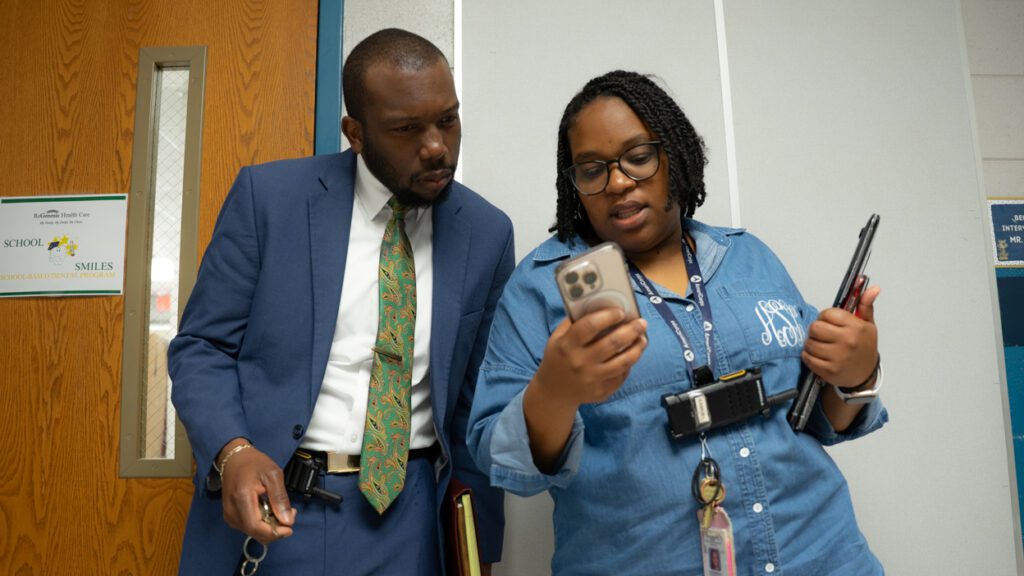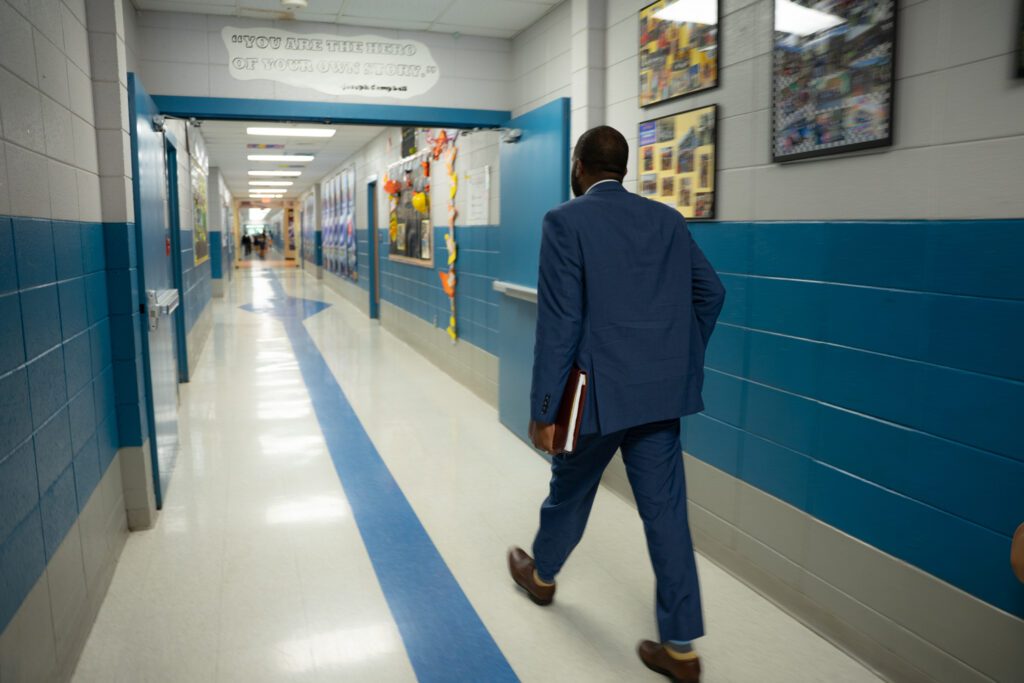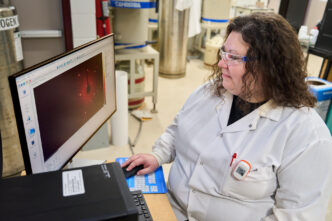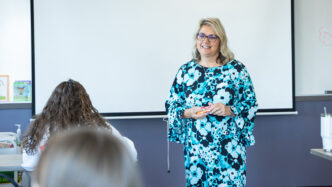Cleveland Academy of Leadership Principal Marquice Clark Ed.D. ’23 makes a significant impact in his school and community by living up to the missions of Call Me MiSTER and Clemson University
Marquice Clark likes to think that people can see the change around the Cleveland Academy of Leadership in Spartanburg before they even enter the building. It’s why he spends a fair amount of time outside, getting his steps in.
There’s the playground 40 yards from the school’s back door that used to be an apartment complex that was no stranger to crime. He remembers being outside with students early in his tenure as a teacher when a police helicopter whirred overhead, and a high-speed chase blew by the school. Now, it’s sunny. Peaceful.
There’s the manicured lawn, the Tiger topiary statues – students have dubbed them Will and Willhelmina, respectively – framing the front entrance, and the preschool across the street, which provides a soundtrack of laughing and playing children. Clark excuses himself from one of his own stories to run across the street and throw a few balls back over the fence that have gone astray. From the looks of those who worked there, this isn’t the first time he has made this assist.
He’s most proud of some of the houses across the road from the school. With the help of donations and no-interest loans from a credit union, he has worked with a few of the school’s families to move them from motels and housing projects into homes after they completed school and community service, health care workshops and educational courses in financial literacy. Since moving into these homes, the students went from frequent behavior referrals to zero.
There’s also his own home, which he shares with his wife and two children, which lies just beyond the playground. He lights up when he talks about it, perhaps even a little brighter than when he talks about the changes at Cleveland Academy or his background as a Call Me MiSTER alumnus from Morris College.

Clark would never claim to be the sole reason behind revitalizing one of South Carolina’s most challenging school settings. However, there’s been a turnaround there since this 2023 Clemson Ed.D. graduate progressed from teacher to assistant principal to principal. It’s why he was recognized as the 2025 South Carolina Elementary Principal of the Year by The South Carolina Association of School Administrators.
It’s the latest honor among many to be bestowed upon him, but Clark moves too quickly to dwell on it. The walkie-talkie on his belt goes off too frequently for him to have time to reflect on it all or let it go to his head. His proof of success is in the homes he has facilitated for families and the one in which he resides. Those dwellings are proof he’s practicing everything he preaches.
“The idea of being a hypocrite is something that every MiSTER struggles with, right?” Clark asks. “We all have to be congruent with our mission statement, we have to care outside the four walls of the school. When I live right across from it, students get to see me modeling effective habits, working in my yard, spending time with my family. I think it makes a world of difference.”

A quiet ride home
The immediate surroundings at Cleveland Academy and the surrounding area weren’t always so attractive.
When Clark graduated from Morris College with a teaching degree, he intended to teach somewhere around Columbia. He had agreed to meet with the administration at Cleveland Academy at the request of his Call Me MiSTER program coordinator, so he made the nearly three-hour drive from Sumter with his wife as a favor.
They arrived Sunday evening for his Monday morning interview. The area surrounding the school was quite different than it is today. He told his wife there was no way he would teach there; the problems were evident before entering the building. His interview proved the area was a “hope, opportunity, food and literacy desert.”

There is a 17-year life expectancy difference between four miles in Spartanburg. Children who grow up on the North side – where Cleveland Academy is located – die at roughly the age of 64. On the East Side, they live to be approximately 81.
The area has a poverty index of 92.5% and a transiency index of roughly 73%, meaning only around 23% of students stay in school from kindergarten to fifth grade. The school still deals with a chronic absenteeism index of about 84%.
When Clark arrived for his interview, Cleveland Academy had a long history of being one of the nation’s worst-performing schools. It was in the bottom fifth percentile of all schools in the state of South Carolina and the bottom 10th percentile of all schools in the nation.
But then Clark stepped inside. He met with teachers and administrators, but what left an impression were the students.
“I saw Cleveland as an oasis. I saw Cleveland as the watering hole that was providing life to so many children,” Clark said.
Cleveland Academy may have been what he expected, but the job interview’s effect on him was anything but. The ride home with his wife was quiet. He doesn’t remember either of them saying a single word until they got to Newberry when she turned to him and said, “I think I already know.”
For Clark, it goes back to every MiSTER’s kryptonite: hypocrisy. The words of his many instructors at Morris College also continued ringing in his ears.
“I don’t know if I could call myself a MiSTER, a Christian or a Morris College alumnus if I had not answered that call,” Clark said. “The Morris College motto is ‘enter to learn and depart to serve,’ so that’s what I set out to do.”
Continuous improvement
Clark served as a teacher for years at Cleveland, serving the community and affecting students one classroom at a time. When the opportunity to become assistant principal and principal arose, he seized the opportunities to make a more significant impact. He pulled in several community partners, including Strive Together, a Cincinnati-based organization focused on improving educational outcomes for children.
With the organization, Clark traveled the country with community leaders for more than a year to learn about continuous improvement science, a structured approach to consistently identifying and solving problems to achieve high-quality results. He wanted to apply these concepts to improve his school or even the entire school system.
As Clark wrapped up his learning experience with Strive Together, he learned of the Clemson University College of Education’s new education doctorate in systems improvement science.
“I fell in love with continuous improvement, and I understood it, so when I learned about the Clemson Ed.D. program, I thought this must be divine,” Clark said. “The program really emphasized how systems are designed to get the results that they’re getting; it’s the old architectural principle that form follows function. In academia, when you don’t shift programming to fit your changing audience, things stop functioning as well, so many of the ills we see in school systems are self-imposed.”
The Ed.D. program challenges its participants with a dissertation that requires them to solve a problem of practice in their schools. Clark implemented the Orton Gillingham literacy intervention with first graders, which relies on the science of phonics to introduce children to standard American English properly. He used this approach to overcome the African American vernacular, or Ebonics, which can be a barrier for many children learning to read.
Over the last six years, innovative approaches in science, reading and math have proven themselves through data. Science achievement has gone from 7% to 55% of students mastering grade-level concepts. The reading achievement has gone from 21% to 53%. Math achievement went from 19% to 58%. Meanwhile, the school has seen a precipitous decline in behavioral issues and behavior referrals.
These improvements came despite COVID-19, which Clark took advantage of as an opportunity to abandon practices that didn’t work, such as doing away with programming that took away from “prime instructional time,” retooling the school’s response to interventions and redesigning schedules to drive more content engagement. He credits many schoolwide improvements to concepts he learned in the Ed.D. program, where continuous improvement can uncover what works for students and challenge statistical norms.
Recently, the South Carolina Education Oversight Committee named Cleveland Academy a South Carolina “Beating the Odds” school, which are schools with a poverty index above 90% that still achieve strong academic results.
Clark takes a holistic approach, as evidenced by the homes across the street from Cleveland. It’s also seen inside the school, where ReGenesis Health Care has a space that provides dental care for students. In September 2024, the school screened students for dental needs and found that roughly a third of students desperately needed dental care.
“Nothing hurts like a toothache, especially when you’re trying to grasp the fundamentals of math, science or social studies,” Clark said. “So, you set up a dentist office in the school.”

To die empty
At a brisk pace, it takes two minutes to walk from Clark’s office to the playground that was once the setting for a high-speed chase. On this particular day, Clark takes nearly 40 minutes.
He talks to every office staff member before coordinating with Alphonso Richard, a Clemson University Call Me MiSTER alumnus and Cleveland Academy assistant principal, on annual performance reviews for staff members. As he heads out the door, he is stopped by a parent – Clark cheerfully addresses her as “mama” – who wants to discuss student behavior, so he guides her back into his office for a debrief.
He stops by room 203, which has now been transformed into the school’s dentist’s office, to check student progress. He moves on after he gets a thumbs-up from the last student in the chair.
Then, it’s a brief chat with the school’s resource officer. Followed by a brief chat with a teacher escorting students to an art class. Followed by a brief chat about a possible family drama pouring over into the classroom. Followed by a brief stop into class testing. Followed by a stop in the cafeteria to check on Mrs. Jan.
“Let me tell you something,” Clark says, scratching his head. “That meatloaf? That meatloaf is good. I’m coming to get me some of that in a little bit.”

“Yes, love,” Mrs. Jan responds, smiling as Clark concludes what is obviously a daily visit.
Clark seems so confident and in control, especially on his turf at Cleveland Academy, but he has doubts like any person. On the day he was surprised by colleagues, family and friends to learn he was named SC Principal of the Year, he was a bit “down in the dumps” about certain work circumstances. All the problems at Cleveland Academy aren’t solved – far from it – and the school still presents challenges.
However, Clark relies on his support system at work and among fellow MiSTERs such as Mark Joseph, program coordinator for Call Me MiSTER at Clemson University. Joseph said that over the years at MiSTER events, such as the program’s summer leadership institute, he has gotten to know Clark and understand his dedication to fellow MiSTERs, his family, students and the community.
Joseph considers Clark the modern-day Nehemiah, a biblical figure appointed to rebuild walls that had fallen into disrepair over many years. Like Nehemiah, Clark successfully rebuilt and brought a vision to life not by himself but with the help of a community. Joseph said there may be no better example of extending the mission of Call Me MiSTER beyond the four walls of the school than Clark.

“You know Dr. Clark has committed himself to a community when you learn his own child attends the school, and he will have two there next year,” Joseph said. “That speaks volumes. It speaks to his vision but also to the trust he has for the other adults in the building. I feel privileged to help him on his journey however I can because, in return, he has given me a glimpse into his world.”
The reception Clark gets with every stop he makes on his walk through the school is the same. Everyone smiles. When asked why, he says it’s because he tries to strike the correct balance of accountability, appreciation and support for every employee in the building. He tries to pay a great deal of attention to it because, contrary to what many might say, he thinks the most critical relationship in the school is not that between student and teacher. As famed educator Roland Barth said, it’s between the principal and the teacher.
“If you get that right, all other relationships will mimic that relationship,” Clark said. “It means the world to me that these folks show up every day and say ‘he’s crazy, but I’ll follow that guy,’ so I spend a great deal of time loving on the folks here in this building.”
Clark said he has seen that ripple effect reach students over the years, and he has seen the changes happen that he hoped for. He feels extremely loyal to Cleveland and the 89 adults who work in the building because they all took a chance on him as an assistant principal and then principal when they could have chosen from dozens across the district for the job.
He feels compelled to give it his all inside and outside the school for a goal beyond his career.
“My objective, quite honestly, is to die empty,” Clark said. “I don’t want to meet my maker with anything left in the tank. I want to have explored it all and have helped as many people as possible. So, when that day does come, I can welcome it knowing that I gave it everything I had.”








